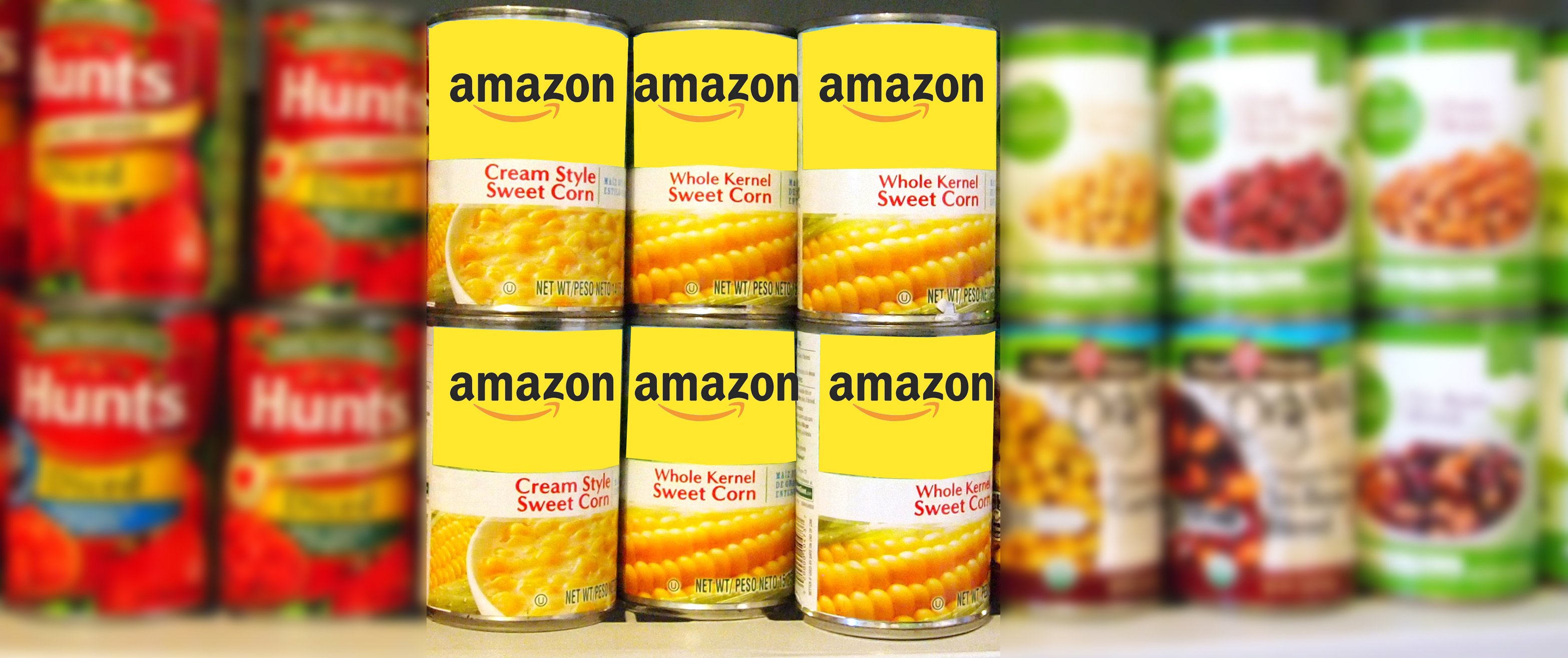Amazon’s Entry Into Private Label Foods Has Broad Impact
Posted by | Fuld & Company

Watch out for Amazon’s entry into private label foods
This is big news, it looks like Amazon is expanding into the private label food business. What do we think this means?
A margin play
What I find interesting about this is their commitment to promoting branded items as well – e.g. Amazon Dash. This might mean that this is more a category play than an Amazon branding play. No doubt Amazon has done the math on the categories that promote the highest margins. So, say, for laundry detergent, if Amazon matches Dash for brands like Tide with its own private label, overall sales in that category grow. Since Amazon has only just barely become profitable this could be a margin play.
Another step towards becoming a true grocery “store”
If you look at the brands that Amazon Dash has partnered with, they are all premium brands. I think Amazon is hybridizing the classic PL positioning play for “good, better, best.” In the short term, the “good” and “better” brands will come under threat from Amazon’s entry-level private label efforts. But there’s no doubt that at some point in the future, Amazon will go up-market and come after the premium brands as well. We’re seeing this happen in the brick-and-mortar stores and we’ll soon see it online.
Amazon also has some of the most sophisticated demand forecasting and pricing models of any retailer. This is a huge advantage, and that’s not to mention their control over the marketing and positioning of their products.
I think this is bigger than a margin play. Amazon likes big bets. Combine this activity with Amazon Fresh. I think it’s an early(ish) indication that Amazon seeks to be a full-fledged online grocery store.
Also, every retailer should war game about the future of Amazon. Is Amazon the online Walmart? Will it change the face of retailing to the same degree that Walmart did when it entered and grew its retail business?? Online grocery is already quite large in the UK. Is that a relevant model?
Private label no longer means sacrificing quality in the consumer’s mind
I think it’s fair to question whether store brands should be classified as private label anymore. Do shoppers at Target, for example, even realize that Archer Farms is a store brand? What’s more, do they care? Staying with Target, if Archer Farms is taking shelf space and market share from nationally recognized labels, it is a competitor to watch, regardless of who manufactures it.
And private label no longer means “unhealthy”
This is a great point, Rachel. The line between private label and national brands has really blurred. Many consumers look more at labels for information now than for brand reassurance. And many see national brands as pushing processed foods full of complicated, potentially unhealthy ingredients, and are consciously moving away from that. (See the recent Fortune cover story about all the challenges to Big Food right now.)
When I went to Trader Joe’s the other night, I didn’t care whether my Belgian waffles and frozen dinners were brand name (they weren’t), as long as the quality and taste were high and consistent. It seems that Amazon has recognized that many shoppers are increasingly embracing private label, and they think the Amazon brand name backing these products will be as good as any national brand.
How can traditional grocers remain competitive?
Amazon’s private label food = back to the future?
Amazon’s plans to sell own brand food is not a significant game changer, or is it?
Deep int he depths of the last century, manufacturers saw retailers as an outlet for their products – the original ‘grocer’ concept, buying in bulk – typically 12 of something (‘a gross’), and then splitting down into smaller units for people to buy. Most consumers didn’t want to buy a case of baked beans and (outside the U.S.) didn’t have space to store in bulk.
All was good, until retailers began to ask the question – who owns the relationship with the people who come into our stores? Do they come because of the products and range we stock, or our brand and what we offer as a shopping experience? (not forgetting price competitiveness as part of the purchase decision making process).
First was the retailer brand. Then the expansion into non-grocery services – such as banking and insurance. Tesco’s move into selling cars in the UK in 2010 was probably a step too far.
Amazon’s launch into private label food is nothing new, but an example of the evolution of retailing. Amazon is a retailer. The only difference is that it doesn’t have physical stores, but mega-distribution centers that send the product to you – the first form of home delivery. It also has a very strong USP – a selling platform and infrastructure for other sellers to reach consumers.
Amazon has the brand power to do this. According to BRANDZ – Millward Brown’s assessment of the world’s biggest brands, the Amazon brand ranked number 10 in 2014, by far the largest retail brand on the planet.
What will be the impact on manufacturers? Profits will probably rise, as retailers will typically accept lower margins for private label products. But they won’t sell more product overall and a new route to market increases supply chain complexity. What will impact them is the ever-changing retail environment and how different companies are adapting to it.
Traditional retailers will feel the impact. Not a paradigm shift, but more competitive pressure in an already crowded market – consumers have more choice than ever before – traditional big retail groups across the world have been affected by hard discounters and are struggling to respond. Amazon already has the infrastructure in place to reap further rewards in online shopping and home delivery. Retailers need to understand how this move will impact themselves and other players in their sector.
One thing is for sure – retailing will look totally different in the future.
The question is, what’s next and how to stay competitive?
What is stopping Amazon?
Amazon is all about efficiency and offering whatever the consumer wants in the best and most convenient form and format. Private label is just one piece of a much larger grocery strategy.
While it’s true that a shopper may – at times – want and need to “feel and smell” a piece of fruit or a zucchini, that does not apply to most groceries, especially to most packaged goods. As Ken said, a box of detergent is a box of detergent. If that is the case for most of the consumer’s shopping cart, then price and convenience win out. Diapers, bottles of soda, detergent are all big and heavy. Once you have these delivered to your house at a price you want, why not order most of your other groceries via Amazon’s “one-click” technology?
Brad Stone, author of The Everything Store (Copyright 2013, Hachette Book Group), the best read on Amazon to date, believes that Amazon’s march to conquer the grocery business is just getting started. Stone writes towards the end of his book, “Will Amazon roll out its grocery service, AmazonFresh beyond Seattle and parts of Los Angeles and San Francisco? Yes, when it has perfected the mechanics of profitable storage and delivery of perishables, like vegetables and fruit.”
I agree with all of the above blog posts on this topic (that doesn’t happen too often). Margin play? Yes. Good, better, best? Yes. High quality offering? Yes. Healthy? Why not? Owning the relationship? Amazon already has many of us in its thrall.
Tags: Competitive Advantage, Consumer Products & Retail, Growth Analytics, Information Technology



















